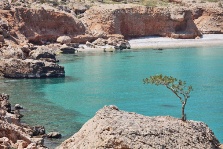 Those in the know when it comes to folk medicine have long believed in the health secrets inherent in the boswellia tree. A new study has uncovered just how powerful an anti-inflammatory agent the herbal remedy boswellia might be.
Those in the know when it comes to folk medicine have long believed in the health secrets inherent in the boswellia tree. A new study has uncovered just how powerful an anti-inflammatory agent the herbal remedy boswellia might be.
Historically and religiously, it has gone by the name “frankincense.’ This is the resin of boswellia, burned for its fragrance in many religious ceremonies. Yet this herb can do so much more. Resin from the trunk of the boswellia tree contains powerful anti-inflammatory substances that could help fight asthma, joint pain, and dermatitis.
PLUS Try This Herb for Inflammatory Diseases
Much about boswellia is unknown in mainstream medicine, despite being an ancient herb used in India’s system of Ayurvedic medicine. Not surprisingly, the latest push is in Germany, which is by far the country in the Western world most open to complementary and alternative medicine.
In the latest study, German researchers showed how the “boswellic acids” (within the resin) specifically interfere with the inflammation process. It seems they interact with certain proteins that are part of the process, but also with an enzyme responsible for creating what’s called “prostaglandin E2.”
I’ll try not to get overly technical here, but “prostaglandin E2” mediates the body’s immune response, and plays a major role in how much inflammation occurs. It also is directly linked to any fever or pain you develop. So, the study found that boswellia blocks the enzyme, thus limiting inflammation (and perhaps pain and fever as well).
And of course, boswellia is a herbal remedy that has fewer and less dangerous side effects than today’s anti-inflammatory drugs. Plus, drugs’ impact may be less specific, so they increase the risk of stomach ulcers and can harm the kidney’s function.
So, which kind of resin works best? There are more than 10 boswellia species in the world. The most well-known and widely-used one is the “Boswellia serrate” from Northern and central India. Yet the researchers found that resin from the “Boswellia papyrifera” is 10 times more potent. This species mostly occurs in the Northeast of Africa (Ethiopia, Somalia) and on the Arabian Peninsula (Yemen, Oman).
Here is the rub: boswellia trees are an endangered tree species and many societies use them just as heating fuel. This is medicine literally going up in smoke. We need to act to save the boswellia species, which could offer so much potential in natural medicine.
